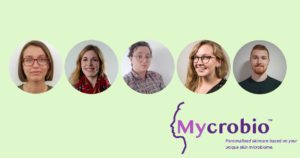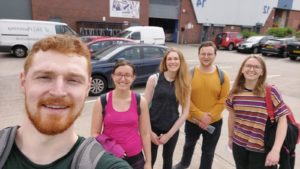You may have heard about the YES competition before – but what does it actually entail and why should you consider joining? We caught up with our DTP-funded team Mycrobio, made up of 5 White Rose DTP PhD students, who took part in the YES20 edition of the competition and won a prize at the final! Read our interview with the team below to find out all about their experience.
What is the YES competition?
YES (Young Entrepreneurs Scheme) is a competition in which teams of 4-5 PhD students and/or post-docs develop and pitch a business plan for a hypothetical company in one of three areas: ‘Biomedical’, ‘Engineering’ and ‘Plant, microbial and environmental’.
Tell us about your team.
Our team was made up of 5 White Rose DTP students and we took part in the Biomedical workshop. We placed in the top three in our workshop which gave us the opportunity to compete in the final, where we were awarded the prize for ‘Best consideration of intellectual property (IP) strategy’, sponsored by Potter Clarkson.
How did you form your team?
Alice formed the team with the help of Catherine Liddle by advertising in the DTP newsletter and contacting people directly based on their research interests, using the DTP website. If you don’t have a team, the YES organisers can also help you find one. We did not know each other beforehand but worked really well together and have finally met up in person since the competition.
Mycrobio recently met up in Leeds for the first time in person! Left to right: Jack Wright, Alice Seleiro, Orlagh Anderson, Laurence de Lussy-Kubisa, Maia Harvey.
Why did you apply to the YES competition?
We all applied to the YES competition for different reasons. We were all interested in how research can be translated into the real world and have impact and saw this as a great opportunity to do something a bit different from the day-to-day life of a PhD student and gain new skills (teamworking, project management, pitching, etc.). Jack and Maia had done their PIPS at Oxford University Innovation and were interested in pursuing careers in technology transfer, market analysis or as patent attorneys, so YES was an opportunity to gain useful contacts and knowledge in those fields.
How did you go about getting funding to attend YES?
We were funded by the White Rose DTP. Our team fit the DTP’s criteria (a team of DTP students from at least two of the White Rose universities) and I would recommend taking these criteria into consideration when forming teams. There is also the option of getting funding from your university (however, we found this quite difficult) and the YES competition itself. We had to write a letter to the DTP outlining why we wanted to attend YES and what the money would be used for. Applying for funding was a new experience for some members in the group, so this also provided the opportunity to learn new skills.
What does taking part in YES entail?
The YES competition was online this year due to COVID-19 restrictions but is usually held in person. As part of YES, you attend a three-day workshop in one of 3 areas (‘Biomedical’, ‘Engineering’ and ‘Plant, microbial and environmental’), where you develop and, ultimately, pitch your hypothetical business plan to a panel of commercialisation experts. Teams typically start working on their business plan prior to the workshop and we met up about once a month in the lead up to the workshop (but the frequency of meeting increased closer to it). 2-3 teams from each workshop are then selected to go to the final where they pitch the business plan again in a bid to win several prizes (for example, this could be a cash prize or an invitation to networking events).
Both prior and during the workshop, there was a lot of help in the form of talks and mentor sessions with experts in commercialisation. The talks were extremely helpful and pointed us to several resources, such as spreadsheets to calculate finances, which we found incredibly useful. The mentor sessions were also invaluable and helped us develop our ideas, particularly in areas we were less confident in, such as finance and IP.
How did you come up with your idea?
Our hypothetical company was called Mycrobio, a company that uses microbiome sequencing to recommend custom skincare products that rebalance the skin microbiome.
We initially had a lot of business ideas and used news articles for inspiration. We managed to further narrow down our ideas by doing some initial market research and soliciting the help of YES mentors who recommended we do a business model canvas for our main ideas, which we found extremely useful. When deciding on an idea and pitching, we would recommend focussing less on the science (all you must do is demonstrate that your idea is realistic and feasible) and more on developing a good business plan. Also, don’t worry if your business idea is not directly related to your research, it can be quite refreshing to work on something different and demonstrates flexibility.
What did you gain from the YES competition?
The YES competition helped develop our confidence to work in an area we are not familiar with, which is a really useful skill, as well as team work, leadership and pitching skills. It also helped us gain a better understanding of how to commercialise research and learn about specific areas of that process, such as market analysis, finance and IP. The YES competition also exposed us to post-PhD careers that we had never considered before, such as becoming a venture capitalist or an entrepreneur.
A real highlight of YES was the opportunity to network with other participants as well as mentors and presenters. Since the competition we have remained in contact with many of the mentors, who have been critical in helping us figure out what we want to do after our PhDs and have also helped us with more practical things, such as CV writing.
What is your advice for students interested in the YES competition?
Go for it! It is such a great experience!


